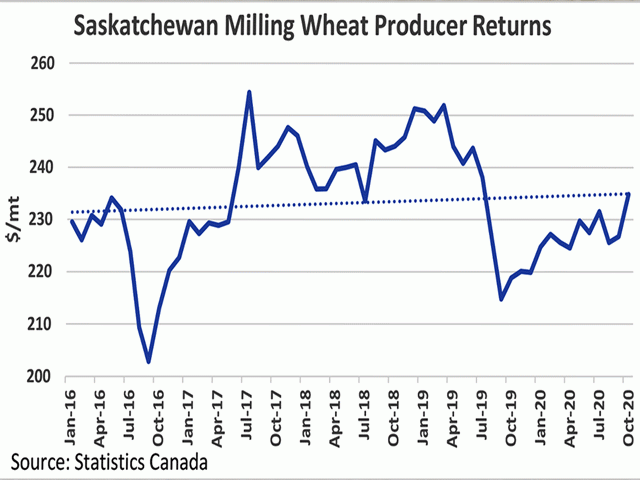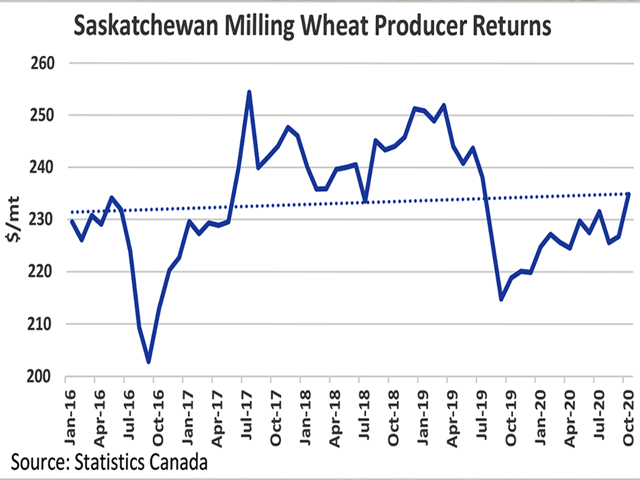Canada Markets
Half-Baked Wheat Data Draws Industry Criticism
For an 11th straight year, Canada's Food Price Report 2021 was released on Dec. 8, which incorporates trends in food demand and forecasts prices for the year ahead. This has historically been released by Dalhousie University, but the University of Saskatchewan and University of British Columbia were a part of the effort this year to capture coast-to-coast trends.
This year's report was one that could have been delivered by the Grinch, with an overall price hike of 3% to 5% forecast for Canada's food in the year ahead, with reports that an average Canadian family will pay an additional $695, or a $13,907 total for food for what they view is an average family of four. "This is the highest increase that we've ever expected," Sylvain Charlebois, head of the study, told the Canadian Press. The largest price increases were forecast for meat and vegetables, with price hikes as high as 6.5% and bakery products as high as 5.5%.
Of course, this study makes for good headlines across all forms of media, with the study pointing to the numerous factors driving food prices, including climate change, issues relating to the pandemic, labour issues, shifts in demand, to name a few. What does seem missing is the effect that the government's carbon tax has had across the entire food supply chain and how this affects prices.
Far down in the piece written by the Canadian Press and carried by many media sources was the forecast that bakery prices are to increase as much as 5.5% in 2021. "The cost of a bushel of wheat hit about $6 in November, up from about $4 roughly 18 months ago -- a 50% increase," Stuart Smyth from the University of Saskatchewan reported to the Canadian Press.
P[L1] D[0x0] M[300x250] OOP[F] ADUNIT[] T[]
This statement led to a quick response from grain industry participants on Twitter and call for a retraction, while study participants defended their findings.
First was the question surrounding the actual grain future followed in order to arrive at this price move over the 18 months in question. The continuous active soft red winter wheat chart does show a May 2018 weekly low of $4.18 1/2 while November highs were in excess of $6/bushel. At the same time, this class of wheat holds a minority share of Canada's domestic wheat milling. Statistics Canada data shows that a combination of western red spring wheat, other western wheat milled and other eastern wheat milled consistently accounts for 74% to 77% of the wheat milled in Canada each month of the first 10 months of 2020.
The choice of SRW, along with the choice of the price move from April/May 2019 to November 2020 seems like cherry-picking to support a conclusion. When quizzed on this on Twitter, author Stewart Smyth stated, "We didn't pick those two dates, I used them as a reference to provide context for what is in the report." Further support came from Sylvain Charlebois who stated that the overall model contained 300,000 data points, while wheat was just one of the 300,000.
This does beg the question, if industry pokes holes in the wheat data and the logic used to support this 50% price increase, can we have faith in the model itself that is weighing on Canadians during a time of pandemic?
While defending the model, the study lead stated on Twitter "Farmers make money, lots of it, full stop. See chart below." The tweet included a chart showing Statistics Canada data showing cash receipts for crops growing from roughly $5 billion to roughly $40 billion between 1975 and 2019. While this is an impressive trend, it does include significant yield increases and productivity gains and it does not include the rising cost structure faced by these same producers over this period, so it really tells only half of the story.
At a time when government programs are being proposed that will heap even more financial burden on the country's producers while production costs continue to climb, the industry needs to be vigilant in correcting any and all false narratives such as this.
Cliff Jamieson can be reached at cliff.jamieson@dtn.com
Follow him on Twitter @CliffJamieson
(c) Copyright 2020 DTN, LLC. All rights reserved.






Comments
To comment, please Log In or Join our Community .